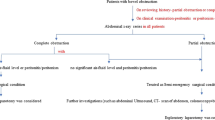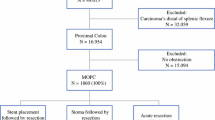Abstract
Introduction
Obstructing colorectal cancer (CRC) has an aggressive clinical course and poorer prognosis. With the increasing incidence and differing clinical and pathologic spectrum of CRC among Black patients, as well as a paucity of African studies, regional analysis is required. Our aim was to describe the demographics and management of obstructing CRC among the different racial groups in South Africa and to compare these parameters with international standards.
Patients and methods
Patients referred to Inkosi Albert Luthuli Central Hospital, Durban, South Africa, with CRC between 2000 and 2012 were followed prospectively. Demographic information, site of obstruction, and management of patients who underwent emergency surgery for malignant large bowel obstruction were analyzed separately.
Results
CRC was diagnosed in 1,425 patients. A total of 203 three patients (14.3 %) required emergent treatment for acute large bowel obstruction. The mean age at presentation with obstructing CRC was 59 years. Black patients presented significantly younger (50 years) than White (64), Indian (60), or Colored (61) patients (p < 0.001). The most common sites of obstruction were the sigmoid colon and rectum. A total of 58 patients (29 %) had concomitant metastatic disease. No difference was found between race, sex, and sex per race in patients with concurrent metastatic disease (p = 0.227, p = 0.415, p = 0.798, respectively). Of the 203 patients, 128 (63 %) were managed by resection, 37 (18 %) by colonic stenting, 35 (17 %) by colostomy, and 3 (2 %) by colonic bypass. Stenting was unsuccessful in six patients.
Conclusion
Tumor location of patients presenting with obstruction is comparable to that cited in international literature; however, the age of presentation among Black patients is more than a decade earlier than in other ethnic groups. Surgical management should be individualized. Stenting remains a reliable alternative in select cases.

Similar content being viewed by others
References
Chen HS, Sheen-Chen SM (2000) Obstruction and perforation in colorectal adenocarcinoma: an analysis of prognosis and current trends. Surgery 127:370–376
Phillips R, Hittinger R, Fry J et al (1985) Malignant large bowel obstruction. Br J Surg 72:296–302
Ohman U (1982) Prognosis in patients with obstructing colorectal carcinoma. Am J Surg 143:742–747
Cheynel N, Cortet M, Lepage C et al (2007) Trends in the frequency and management of obstructing colorectal cance in a well-defined population. Dis Colon Rectum 50:1568–1575
Tentes AA, Mirelis CG, Kakoliris S et al (2009) Results of surgery for colorectal carcinoma with obstruction. Langenbecks Arch Surg 394(1):49–53
Umpleby HC, Williamson RC (1984) Survival in acute obstructing colorectal carcinoma. Dis Colon Rectum 27:299–304
Zulu B, Madiba T (2011) Colorectal cancer in KwaZulu-Natal: an established disease with a variable clinicopathological spectrum. S Afr J Surg 49(2):84–87
PASW Statistics 21 (2009) Rel. 18.0.0. Chicago: SPSS Inc
Aslar AK, Ozdemir S, Mahmoudi H et al (2011) Analysis of 230 cases of emergent surgery for obstructing colon cancer—lessons learned. J Gastrointest Surg 15:110–119
Tekkis PP, Kinsman R, Thompson MR et al (2004) The Association of Coloproctology of Great Britain and Ireland study of large bowel obstruction caused by colorectal cancer. Ann Surg 240:76–81
Cronje L, Paterson AC, Becker PJ (2009) Colorectal cancer in South Africa: a heritable cause suspected in many young black patients. S Afr Med J 99(2):103–106
Vergouwe F, Boutall D, Stupart D et al (2013) Mismatch repair deficiency in colorectal cancer patients in a low-incidence area. S Afr J Surg 51(1):16–21
Serpell J, McDermott F, Katrivessis H et al (1989) Obstructing carcinomas of the colon. Br J Surg 76:965–969
Lee Y, Law W, Chu K et al (2001) Emergency surgery for obstructing colorectal cancers: a comparison between right-sided and left-sided lesions. Am Coll Surg 192:719–725
Runkel N, Hinz U, Lehnert T et al (1998) Improvement outcome after emergency surgery for cancer of the large intestine. Br J Surg 85:1260–1265
Alvarez J, Baldonedo R, Bear I et al (2005) Obstructing colorectal carcinoma: outcome and risk factors for morbidity and mortality. Dig Surg 22:174–181
Smothers L, Hynan L, Fleming J et al (2003) Emergency surgery for colon carcinoma. Dis Colon Rectum 46:24–30
Wang H, Lin J, Mou C et al (2004) Long-term prognosis of patients with obstructing carcinoma of the right colon. Am J Surg 187:497–500
Waldron RP, Donovan IA (1986) Mortality in patients with obstructing colorectal cancer. Ann R Coll Surg 68(4):219–221
Ram E, Sherman Y, Weil R et al (2005) Is mechanical bowel prep mandatory for elective colon surgery? A prospective randomized study. Arch Surg 140(3):285–288
Jung B, Pahlman L, Nystrom PO et al (2007) Multicentre randomized clinical trial of mechanical bowel preparation in elective colonic resection. Br J Surg 94(6):689–695
Watt AM, Faragher IG, Griffin TT et al (2007) Self-expanding metallic stents for relieving malignant colorectal obstruction: a systematic review. Ann Surg 246(1):24–30
Acknowledgment
The authors would like thank Professors Michael G. Sarr and S.R. Thomson for their correspondence and valuable contribution. No grant support was received for the research.
Conflicts of interest
No potential or real conflicts of interest exist
Author information
Authors and Affiliations
Corresponding author
Rights and permissions
About this article
Cite this article
Moolla, Z., Madiba, T.E. Trends in Demographics and Management of Obstructing Colorectal Cancer. World J Surg 38, 2466–2470 (2014). https://doi.org/10.1007/s00268-014-2595-y
Published:
Issue Date:
DOI: https://doi.org/10.1007/s00268-014-2595-y




